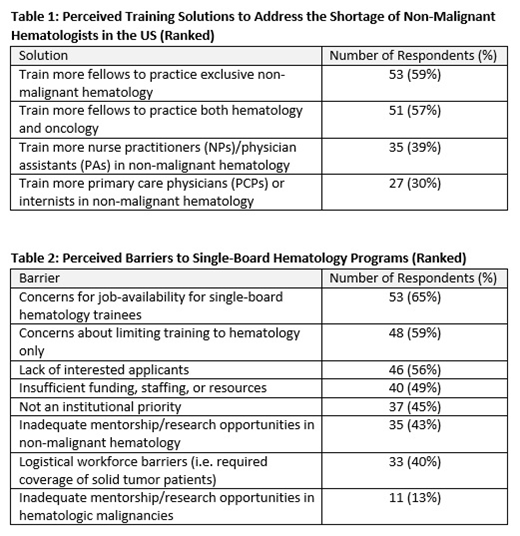BACKGROUND: The American Board of Internal Medicine (ABIM) offers separate board examinations for adult hematology and medical oncology, yet the vast majority of fellowship training programs in the United States are structured as combined hematology/oncology programs. Single-board hematology tracks or programs may help increase recruitment and retention in non-malignant hematology; however, the barriers and attitudes toward hematology-only fellowship programs are unknown. We administered a survey to ACGME-accredited hematology/oncology program directors to explore their perceptions toward training in non-malignant hematology and their attitudes toward single-board hematology training.
METHODS: In collaboration with the ASH Medical Educators Institute, we developed an anonymous online survey with 30 multiple-choice and open-ended questions to characterize attitudes toward specialization in non-malignant hematology and to assess program director interest and perceived barriers toward single-board hematology training. The survey was electronically administered to program directors of active hematology/oncology fellowship programs in the United States (n=139) in March/April 2019 using Qualtrics software.
RESULTS: Of the 139 program directors who received the survey, 90 (65% response rate) completed the survey. The majority of program directors characterized their institutions as academic (87%), with only 9 (10%) describing their programs as community-based. Seventy-eight (87%) program directors believed that there is a shortage of exclusive non-malignant hematologists in the United States, and 59% felt that training more fellows to practice exclusive non-malignant hematology could help address the shortage (Table 1). Jobs for for exclusive non-malignant hematologists were perceived to exist only in academic settings by 47 (52%) respondents.
In terms of fellowship training, program directors reported that an average of 5% of fellows per program pursued a career largely or exclusively focused on non-malignant hematology. In addition, 39 (43%) program directors felt that fellows were dissuaded from pursuing a career exclusively in non-malignant hematology.
Regarding single-board hematology training, 73% of program directors believe that hematology-only training is both necessary and sufficient for fellows specializing in non-malignant hematology. The most commonly perceived barriers to single-board hematology fellowship programs were: 1) concerns for job availability for single-board hematology trainees, 2) concerns about limiting the training option to hematology only, and 3) lack of interested applicants to the program (Table 2). If barriers were addressed, 37% of programs directors reported that they would be interested in implementing a single-board hematology track at their institution.
CONCLUSIONS: Combined hematology/oncology fellowship training is nearly exclusive to the United States. Our survey demonstrates that the percentage of fellows specializing in non-malignant hematology is significantly low (5%), a number that remains unchanged compared to a prior ASH program director survey in 2003. Our results also suggest that programs directors are interested in training fellows in non-malignant hematology and that single-board hematology training is generally acceptable among program directors. It will be important to address perceived barriers to hematology-only programs in order to promote implementation.
Naik:Elsevier: Other: Content Editor. Nagalla:Alnylam: Membership on an entity's Board of Directors or advisory committees.
Author notes
Asterisk with author names denotes non-ASH members.


This feature is available to Subscribers Only
Sign In or Create an Account Close Modal